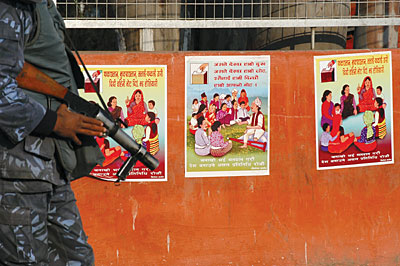 MIN RATNA BAJRACHARYA |
The Nepali state faces twin crises â�" a failure to elect a new prime minister for the past two months, and a failure to elect new local bodies for the past eight years.
But a caveat is essential at the outset. There is resilience and robustness in the political system in Nepal that is often underestimated. This is because the purpose of the state structure is not to fulfil welfare functions, but to survive â�" first by fighting and then co-opting assertive social forces, and tying them into existing patronage networks. Despite the vacuum that we witness at present, Nepal is not about to become a failed state.
But the absence of a strong, functional, legitimate government at the centre is of course a problem. A full budget has not been presented yet and its impact can be felt across government offices, and in general and development expenditure. Policy decisions are left pending, files remain unsigned, and bureaucrats prefer to play it safe till the next political boss has taken office. For a donor footing the bill with little tangible outcome, an MP waiting to get funds for an already sanctioned road, a CDO who has referred a case to the Home Ministry, or a normal citizen in queue for paperwork, there is frustration all around at how routine administrative work is stuck.
The fact that government formation is so inextricably linked to the peace process and constitution writing makes the task even more urgent. Timelines have already been missed. Little homework has been done to reconcile the core ideological divergence on contentious issues. Non-Maoist parties will not accept a statute as long as the PLA is in the cantonments, and the Maoists will not move on integration till they get a stake in the government and guarantees on the constitution.
Couple this with the fact that the process will take far longer than people think and the 60-week timeline of UNMIN could well be a conservative estimate. Just a reminder â�" registration and verification of combatants took almost the whole of 2007. Given these trends, we can almost certainly say that there will be no constitution by the new deadline. The present political jostling is to be in an advantageous position on May 29, 2011.
Add to this the other, almost invisible, crisis â�" the absence of legitimately elected local bodies. Depending on their strength in their respective areas, parties have constituted joint committees at the district and village level. They sometimes work far more harmoniously locally than at the top. Read: the parties share the loot more peacefully on local tenders, contracts, and funds for school management committees and various user groups.
But there are several problems with such an arrangement. It just does not have the legitimacy that elected representatives possess, thus restricting decision-making abilities and leading to questions about expenditure, and eroding the credibility of the process. In areas where the balance of power among parties is not defined, or where newer groups fall outside the committees, conflict sharpens and often takes a violent turn; many killings and abductions in the Tarai are to do with the sharing of local budgets. Local leaders often complain about these issues to the top brass in Kathmandu, which only adds to the inter-party trust deficit. The bureaucrats at the VDC and district level skim off money, but often have to pay the price in terms of personal insecurity, which explains their exodus to district headquarters or the capital. There is little accountability and instead of reform, the rot in the system deepens.
And there is no prospect of elections at the local level in the near future. Do you wait for the new constitution to ascertain the governance system first? Even after that, do you first have general elections, provincial elections, and only then local level polls? This could well be another five years down the line, in the highly unlikely event that there is a constitution on time. Is it possible then to hold elections under the old model immediately? But will parties agree to it, especially those who have little confidence about their popular strength at the grassroots and fear a rout? Or are they more comfortable with what is an arbitrary, almost illegitimate, manner of deciding local political outcomes?
The only reason why the state continues to thrive despite these multiple crises is because a large section of Nepali citizens have seceded from it and have little expectations. But for their long-term survival, the present political leadership would do well to think beyond Baluwatar.
READ ALSO:
The winner can't take all, PUBLISHER'S NOTE
The urban bias, CK LAL
Nein Kampf, INDU NEPAL



